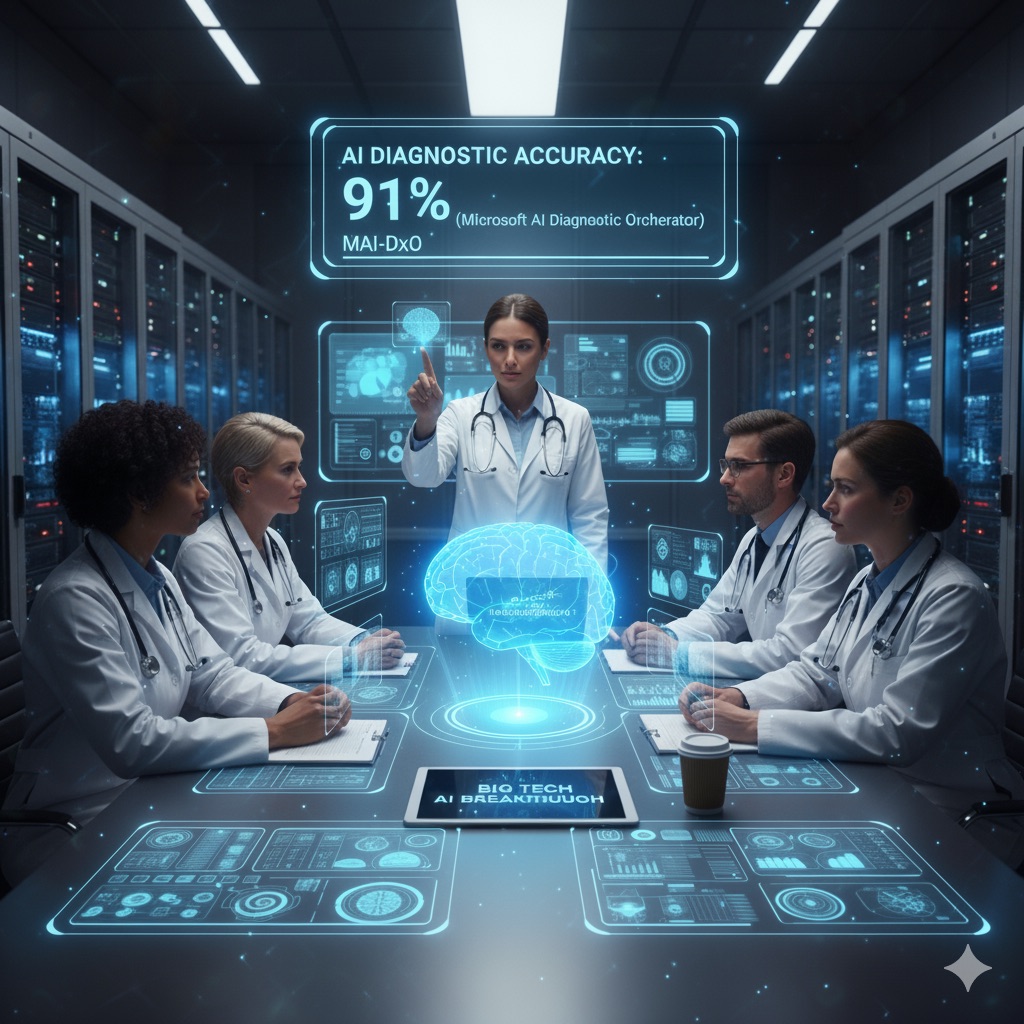Revolutionary AI Technologies Set to Transform Healthcare for Both Medical Professionals and Patients
Global tech giants are making remarkable breakthroughs in healthcare innovation through AI and big data technologies. Microsoft’s recently unveiled ‘MAI-DxO (Microsoft AI Diagnostic Orchestrator)’ system has achieved over 90% accuracy by mimicking actual medical diagnostic processes, setting a new milestone in medical AI.
Breakthrough Improvements in Diagnostic Accuracy and Treatment Outcomes
Microsoft’s MAI-DxO system combines multiple large language models to perform diagnoses in a collaborative manner, similar to a medical team. The system has improved diagnostic accuracy by 15-20% compared to traditional single AI models, particularly excelling in complex rare disease diagnosis. The system significantly outperformed existing AI systems in the Sequential Diagnosis Benchmark (SDBench), which mimics the actual sequential process of patient diagnosis in clinical environments.
Google’s AlphaFold-based drug development has also shown remarkable progress. Anti-cancer drugs developed by subsidiary Isomorphic Labs have entered clinical trial phases within a timeframe shortened by over five years compared to traditional drug development processes. This became possible as AI can now predict the success rate of drug candidates with over 80% accuracy.
Reduced Medical Errors and Personalized Treatment
Big Tech’s medical AI technologies are significantly reducing medical errors. Microsoft’s ‘Nuance DAX’ system analyzes doctor-patient conversations in real-time and automatically creates electronic medical records, reducing documentation errors by over 70%. AI also alerts medical staff to critical symptoms or test results they might miss, lowering misdiagnosis rates by over 30%.
Apple Watch’s ECG and blood oxygen monitoring features contribute to early detection of heart conditions like atrial fibrillation, reducing sudden cardiac death risk by over 20%. Personalized preventive care based on individual health data maximizes treatment effectiveness while minimizing side effects.
Improved Healthcare Accessibility: Telemedicine and Cost Reduction
Amazon’s telemedicine service ‘Amazon Clinic’ and online pharmacy ‘Amazon Pharmacy’ have significantly improved healthcare accessibility. Patients in rural areas or those with mobility limitations can now receive specialist care, contributing to healthcare equity solutions. Through telemedicine, patients have reduced hospital visits by over 40%, leading to savings in transportation costs and time.
NVIDIA’s ‘Clara’ platform has shortened medical image analysis time from hours to minutes, enabling rapid diagnosis in emergency situations. The ‘fastMRI’ project has reduced MRI scan time by 75%, significantly decreasing patient waiting times while maintaining image quality.
Healthcare Cost Reduction and Economic Impact
Big Tech’s medical AI solutions demonstrate clear cost-saving effects. Hospitals implementing AI-based diagnostic systems have achieved 25-30% average reduction in diagnosis-related medical costs, reducing patient burden by eliminating unnecessary tests and re-examinations. The obesity treatment GLP-1 drugs’ combined chronic disease prevention effects are expected to save tens of percent in long-term diabetes and cardiovascular disease treatment costs.
In drug development, AI utilization has shortened the traditionally 15-year, $3 trillion development process to 8-10 years and $1.5-2 trillion. This provides pharmaceutical companies facing patent cliffs with new breakthrough opportunities.
Current Implementation Status and Expansion Plans
Major Korean university hospitals are currently reviewing AI diagnostic system implementation through partnerships with Microsoft and Google. Samsung Medical Center and Asan Medical Center plan to begin pilot operations in the second half of this year, with full-scale deployment expected next year. The government is also actively supporting AI medical technology adoption through the ‘Digital Healthcare Innovation Strategy,’ anticipating fundamental changes in Korea’s healthcare environment within 3-5 years.
*This information does not replace medical advice. Please consult with healthcare professionals for personalized treatment recommendations.

